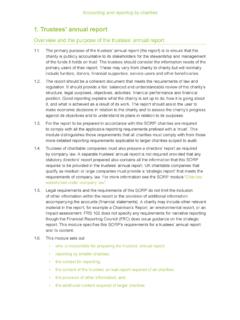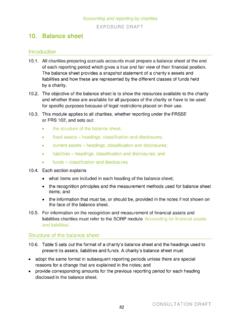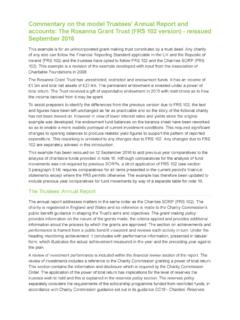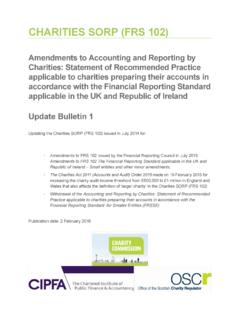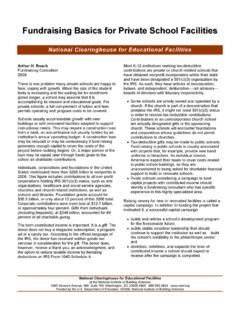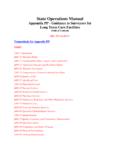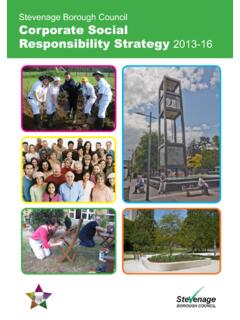Transcription of 5. Recognition of income, including legacies, …
1 Accounting and reporting by charities5. Recognition of income , including legacies , grants and contract income is the inflow of economic benefits to a charity from the activities that it undertakes. income is an inflow of resources that results in an enhancement to the charity s assets or a decrease in its Charities that provide goods or service under contact (exchange transactions) should refer to section 4 of the FRSSE. Aside from the Recognition of government grants and gifted tangible fixed assets, the FRSSE does not deal with the Recognition of income from non-exchange transactions ( including gifts, donations and legacies ). This SORP requires charities to adopt current accounting practice for the Recognition of income from non-exchange transactions.
2 This module of the SORP reflects current accounting practice for non-exchange transactions. Charities should also have regard to paragraphs to of section 34 of FRS 102 and Appendix B to section 34 of FRS 102 when developing their accounting policies for the Recognition of non -exchange This module sets out: understanding the nature of income ; general rules for income Recognition ; general principles for recognising income from donations and grants ; identification of terms and conditions; performance-related conditions; other terms and conditions that limit the Recognition of income ; deferring income where conditions that limit Recognition are not met; terms and conditions that do not prevent Recognition ; recognising income from legacies .
3 income from donated goods, facilities and services; income from contracts for the supply of goods and services; income from membership subscriptions; income from interest, royalties and dividends; settlement of insurance claims; and disclosures and notes to the and reporting by charitiesUnderstanding the nature of There are two broad categories of income : income from exchange transactions ( contract income ) and income from non-exchange transactions (gifts). It is important for charities to distinguish between the two as they are recognised differently in a charity s income from exchange transactions is received by the charity for goods or services supplied under contract .
4 The income the charity receives is approximately equal in value to the goods or services supplied by the charity to the purchaser. The essential feature of income from a non-exchange transaction is that the charity receives value from the donor without providing equal value in income from non-exchange transactions (gifts) are donations of money, goods, facilities or services which are given freely to the charity by a donor. grants are a form of non-exchange transaction where the grant-maker awards a grant without receiving equal value in exchange. However, even though grants are classified as non-exchange transactions, a grant may be presented as income from charitable activities where the payment is made to secure the provision of particular goods or A donation or grant that can be used for any purpose of the charity is unrestricted income .
5 However, a donation or grant may be restricted to a specific purpose of a charity. A restriction may result from a specific appeal by the charity, or from the decision of the grant-maker or donor to support a specific purpose of the charity rather than making funds available for the charity s general use. Simply because a grant is restricted to a particular purpose of the recipient charity does not mean it should be recognised as a performance-related grant. Restricted grants that are not subject to performance-related conditions are included within the SoFA heading income from donations and legacies . Transactions must be accounted for and presented in accordance with their substance and not simply their legal form.
6 Charities must therefore consider the substance of any conditions attaching to donations or grants and to the substance of any contractual terms when determining their entitlement to income . Similarly, the substance of any restriction placed on the use of income must be considered when determining whether or not income is presented as restricted funds in a charity s accounts. In particular, a charity should consider: Whether entitlement to income is subject to fulfilling performance-related conditions. Performance-related conditions distinguish a contract or performance-related grant from an unconditional gift or grant. The terms of a donation or grant that impose a restriction on use which is narrower than the general purposes of the charity.
7 Terms placed on gifts that limit a charity s discretion over how income must be used are presented as restricted income in the and reporting by charities The terms of a contract may limit payments to amounts expended by the charity on purposes specified in the contract and restrict the charity s use of any surplus. income that is restricted by contractual terms may be presented as restricted in the accounts if the restrictions are in substance the same as would apply to a restricted donation or grant. The terms of a gift that require it to be held as endowment that must be invested and not spent. Material endowment funds must be presented as a separate class of restricted rules for income income is recognised in the statement of financial activities (SoFA) when a transaction or other event results in an increase in the charity s assets or a reduction in its liabilities.
8 This SORP requires that income must only be recognised in the accounts of a charity when all of the following criteria are met: Entitlement control over the rights or other access to the economic benefit has passed to the charity. Probable income is recognised when there is sufficient certainty of receipt (receipt is more likely than not); Measurement the monetary value or amount of the income can be measured reliably and the costs incurred for the transaction and the costs to complete the transaction can be measured All income must be reported gross when raised by the charity (or by volunteers working at the charity s direction) or its agents. Any fee charged for fundraising by a third party and deducted from the amount collected before it is remitted to the charity must not be offset against fundraising income recognised in the accounts but be reported as a fundraising expense.
9 However, in the case of individuals not employed by, or contracted by, the charity who are acting on a purely voluntary basis and outside of the charity s control, the charity recognises the net amount principles for recognising income from donations and This SORP requires charities to adopt current practice when accounting for income from non-exchange transactions. income from donations or grants is recognised when there is evidence of entitlement to the gift, receipt is probable and its amount can be measured In the case of a grant, evidence of entitlement will usually exist when the formal offer of funding is communicated in writing to the charity. However, some grants will contain terms or conditions that must be met before the charity has entitlement to the In the case of a donation, entitlement usually arises immediately on its receipt.
10 However, some gifts may include terms or conditions which must be met before the charity is entitled to the and reporting by charitiesIdentification of terms and Charities need to identify donations or grants that are subject to terms or performance-related conditions or other conditions that must be met before there is unconditional entitlement to the gifted Not all terms or conditions attaching to a grant or donation prevent its Recognition as income . A term or condition that simply restricts the use of a grant or donation does not affect a charity s entitlement to the gift and Recognition of income . However, a restriction does affect how the gift or grant is reported in the accounts.



